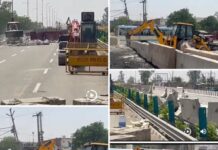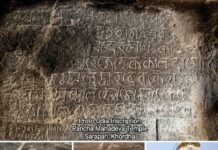By Our Correspondent
NEW DELHI/FAIZABAD/LUCKNOW: The Supreme Court on Saturday pronounced that the Ram Temple will come up in the disputed land in Ayodhya, while the Muslims will get alternative land
Delivering the Ayodhya verdict, CJI Ranjan Gogoi on Saturday underlined that law must stand apart over political considerations, religion and beliefs.Justice Gogoi, who heads the five-judge Constitution Bench set up to decide the decades-old land dispute in the Ramjanmabhoomi Babri case, said the court, as a secular institution, should uphold all beliefs and religion.Justice Gogoi, who estimated that it will take half-an-hour to read out the operative portion of the verdict, has said that the constitution bench’s verdict on Ayodhya is “unanimous”.
The Supreme Court on Saturday said in the scheme by Board of trustees, appropriate representation be given to Nirmohi Akhara.Centre will hand over the disputed site to the Board of trustees and a suitable alternative plot of land measuring 5 acres at Ayodhya will be given to Sunni Waqf Board.
SC says Centre will formulate a scheme in three months to set up a board of trustees for construction of temple at the disputed structure.
SC orders allotment of alternative land to Muslims for setting up of a mosque while decreeing the disputed site to deity.
SC appreciates role of mediators Justice Kalifulla, ace mediator Sriram Panchu and Sri Sri Ravi Shankar who came very close to settlement.
It said Muslims have presented no evidence of exclusive possession prior to 1857. But thereafter they offered namaz there till they were ousted in 1949 through desecration.
SC says Allahabad HC was wrong in dividing the disputed site into three parts. SC says it will give relief in suits filed by Sunni Waqf Board and deity
Desecration of mosque by placing idols in 1949 and demolition is contrary to law: SC. Sunni Waqf board failed to make claim on adverse possession over the mosque as it remained a contested site between Hindus and Muslims: SC.
SC says Centre will formulate a scheme in three months to set up a board of trustees for construction of temple at the disputed structure.
SC orders allotment of alternative land to Muslims for setting up of a mosque while decreeing the disputed site to deity
Muslims have presented no evidence of exclusive possession prior to 1857. But thereafter they offered namaz there till they were ousted in 1949 through desecration: SC
The Court said Act of placing idols inside the central dome in December 22-23, 1949 has been challenged by Sunni Waqf Board. SC says Sunni Board’s suit is maintainable.
Accounts of travellers and historians mention faith of Hindus that the place is birthplace of Lord Ram. The account of travellers has to be read with circumspection, SC says
Whether belief and faith is justified is beyond the ken of judicial scrutiny: SC
The Court said it is committed to protect all religion and ASI an expert authority and Archaeological evidence cannot be brushed aside as conjecture and hypothesis. Babri Masjid was not constructed on vacant land but on a Hindu structure.
But documents show that prior to 1857, Hindus were not barred from worshipping in the inner courtyard. The railings segregating the outer and inner courtyard was made in 1857: SC
SC: Though there were obstructions, Muslims continued to offer namaz inside the inner courtyard. So, the Muslims have not abandoned the mosque
It is clearly established that while Muslims offered prayers inside the inner courtyard, the same was done by Hindus in the outer court yard: SC. ASI (Archaeological Survey of India) credentials are beyond doubt and the findings cannot be neglected, says CJI.
But Hindus always believed that the birthplace of Ram was in the inner courtyard of the mosque, says SC. But documents show that prior to 1857, Hindus were not barred from worshipping in the inner courtyard. The railings segregating the outer and inner courtyard was made in 1857: SC
SC: Though there were obstructions, Muslims continued to offer namaz inside the inner courtyard. So, the Muslims have not abandoned the mosque
Destruction of mosque in 1992 was in breach of SC order, says CJI-led bench. For 325 years, from the construction of the mosque till 1857, Muslims have given no evidence of offering prayers at the disputed structure in exclusion of Hindus, it says.
SC says that the disputed land was the government land in the revenue records. Nirmohi Akhara suit is not maintainable and it has no shebait rights (priestly rights), rules SC.
Idols of deity were placed at the structure in 1949: CJI. Places of Worship Act reaffirms commitment of India to protect the interests of all religious communities, says CJI-led bench
It is inappropriate for the court to get into the area of theology, says CJI.
Babri mosque was built by Mir Baqi, says CJI Gogoi while reading out the unanimous verdict. SC dismisses plea of Shia Waqf Board against Sunni Board on claim to Babri Masjid.
Accounts of travellers and historians mention faith of Hindus that the place is birthplace of Lord Ram. The account of travellers has to be read with circumspection, SC says.
Whether belief and faith is justified is beyond the ken of judicial scrutiny: SC. Faith and belief of Ayodhya being birthplace of Ram is undisputed so is that of Muslims to worship at the mosque: SC. Title of the land can be decided only on legal evidence, SC says






























